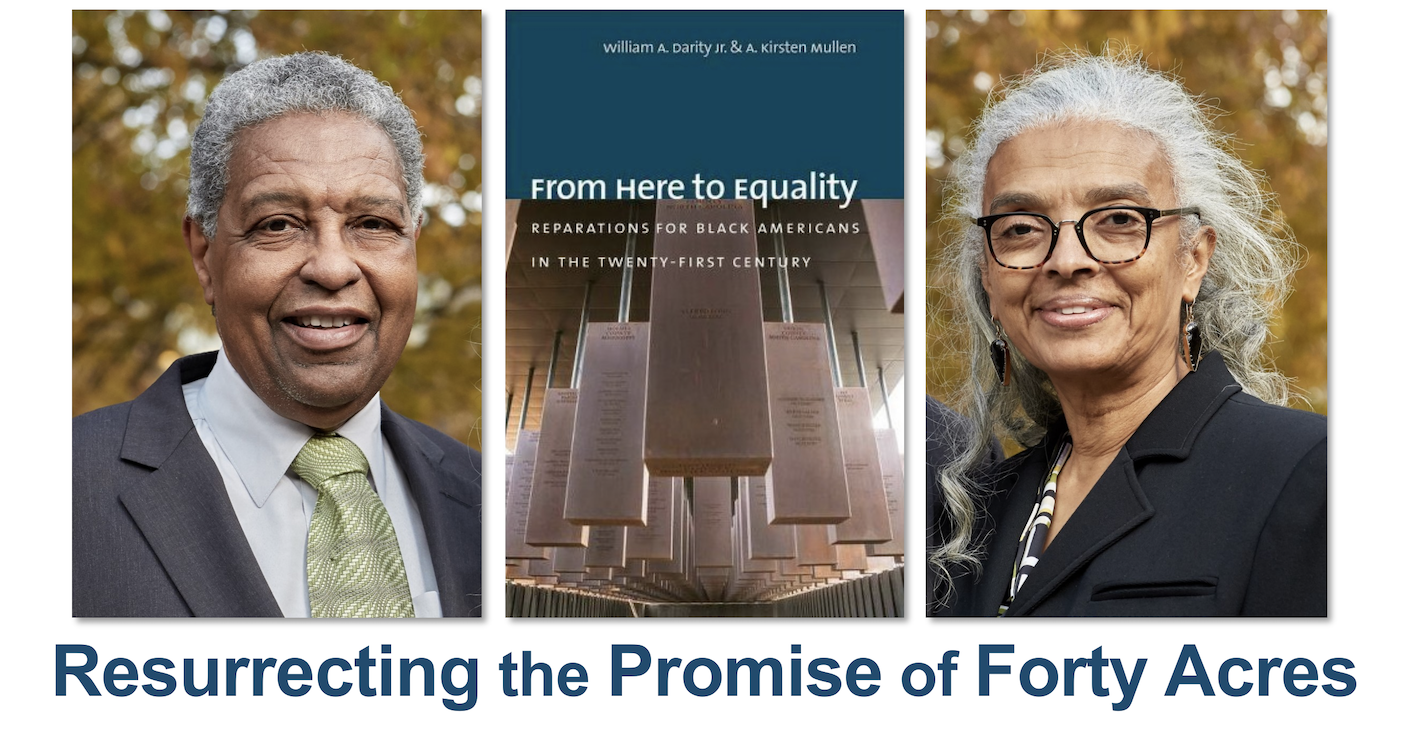
Thursday, February 25, 2021 | 4:00-5:15pm PT
Resurrecting the Promise of Forty Acres
Advanced Registration is Required: RSVP here
Join William A. Darity Jr. & A. Kirsten Mullen as they discuss the message of their book From Here to Equality: Reparations for Black Americans in the Twenty-First Century. The authors will examine the limitations and weaknesses of piecemeal attempts at reparations, particularly the inability of such steps, to eliminate the black-white differential in wealth. The case for African American reparations is directly linked to the basis of the damages of slavery, the harms of the Jim Crow period, and anti-black atrocities in the post-Civil Rights Acts era, positioning the US government as the culpable party that must pay the debt. The authors will establish the particularity of African American reparations for black Americans, compare a variety of methods for establishing the appropriate size of the reparations fund, and how best to disburse the funds. African American reparations, according to Darity and Mullen, is the mechanism to assure the material conditions for full citizenship for the black community in the United States. From Here to Equality: Reparations for Black Americans in the 21st Century is the recipient of the inaugural 2021 Book Prize from the Association of African American Life and History and the 2020 Ragan Old North State Award for Non-fiction from the North Carolina Literary and Historical Association. Ralph Richard Banks, the Jackson Eli Reynolds Professor of Law and faculty director of the Stanford Center for Racial Justice, will moderate the discussion.
About the speakers
William A. Darity Jr. is the Samuel DuBois Cook Professor of Public Policy, African and African American Studies, and Economics and the director of the Samuel DuBois Cook Center on Social Equity at Duke University. He has served as chair of the Department of African and African American Studies and was the founding director of the Research Network on Racial and Ethnic Inequality at Duke. Darity’s research focuses on inequality by race, class and ethnicity, stratification economics, schooling and the racial achievement gap, North-South theories of trade and development, skin shade and labor market outcomes, the economics of reparations, the Atlantic slave trade and the Industrial Revolution, the history of economics, and the social psychological effects of exposure to unemployment.
A. Kirsten Mullen is a folklorist and the founder of Artefactual, an arts-consulting practice, and Carolina Circuit Writers, a literary consortium that brings expressive writers of color to the Carolinas. She was a member of the Freelon Adjaye Bond concept development team that was awarded the Smithsonian Institution’s commission to design the National Museum of African American History and Culture. Under the auspices of the North Carolina Arts Council she worked to expand the Coastal Folklife Survey. As a faculty member with the Community Folklife Documentation Institute, she trained students to research and record the state’s African American music heritage. Kirsten was a consultant on the North Carolina Museum of History’s “North Carolina Legends” and “Civil Rights” exhibition projects. Her writing in museum catalogs, journals, and in commercial media includes “Black Culture and History Matter” (The American Prospect), which examines the politics of funding black cultural institutions.
This event is co-sponsored by the Stanford Basic Income Lab, the Center for Ethics and Society and the Center for Comparative Studies in Race & Ethnicity.